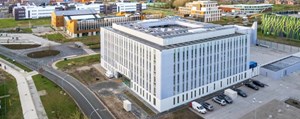News
DNV grows energy testing capability in Groningen with new technology center
DNV, the independent energy expert and assurance provider, has opened its new Technology Centre on Groningen’s Zernike campus, a vibrant ecosystem of education, business and research activities. The new, sustainable facility is equipped with the latest testing equipment to support DNV’s research into the decarbonization of energy systems.
The Technology Centre will articulate research and technology qualification for the energy sector around several axis, aiming to:
- demonstrate and qualify low-carbon technologies
- optimize and repurpose existing gas infrastructure,
- provide innovative metrology for energy systems,
- lead research on H2 & H2-derived fuels, and
- conduct safety analyses and failure investigations.
The new Groningen facility is part of DNV’s network of Technology Centers that leverage the group’s century-old experience in the maritime and energy sectors to qualify and apply advanced technologies for global transformations. The Technology Centers drive innovation and standardization by bringing industry players together in joint industry programs to develop trusted guidelines, recommended practices and standards. This ultimately enables the reliable operation of critical assets and systems, by establishing operational limits and assuring performance through the lifetime of oil and gas, renewables, and aquaculture assets.
DNV’s research laboratories in Groningen had already grown into an international reference on H2 R&D, prompting the expansion of its facilities: “As DNV’s research and innovation activities are often at the forefront of driving technology and industry standards forward, including in the upscaling of new technologies, we have grown our capabilities to meet the needs of the industry, explains Prajeev Rasiah, Executive Vice President for Energy Systems, Northern Europe, Energy Systems at DNV. We expanded our global H2 network of multidisciplinary experts over the last few years, and we are keeping this momentum going with several Technology Centre updates globally this year, including the opening of this major Technology Centre in Groningen. What this demonstrates is our commitment to reaching the targets set by the Paris Agreement and to supporting the energy industry in removing risks around the implementation of clean energy solutions for the transition.”
Today was the first of a two-day inauguration event, gathering international energy professionals around a seminar and networking event on the theme “Act now: towards a secured decarbonized energy future”. The occasion also enabled DNV’s global pipelines experts from the group’s various Technology Centers in Groningen, Spadeadam, Oslo, Bergen and Columbus, to present a new white paper “Repurposing onshore pipelines for H2: Guiding operators through the re-evaluation process”. This study, intended for both industry and regulators, explores current standards and challenges, and presents a new process to assess the safety and feasibility of repurposing natural gas pipelines for H2 based on rigorous evaluation.
“As H2 is a crucial element to decarbonize hard-to-abate sectors, we expect that it will make up 15% of the energy mix in Europe by 2050, but scaling H2 value chains will only happen if we suitably manage safety risk and public acceptance, and that’s where we come in,” added Prajeev Rasiah. We are committed to helping the energy industry to repurpose pipelines safely and effectively, and we are heavily involved in research, collaboration, and projects towards this aim. Together with industry and authorities, we aim to overcome the challenge of repurposing natural gas pipelines to transport H2, removing a significant barrier to the scaling of H2 as an essential low-carbon energy carrier.”


